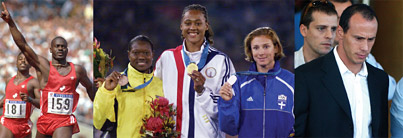In the News: Dick Pound
THE STRAIGHT DOPE:
Catching Cheaters in Olympic Sport

Nicolas Morin
McGill Chancellor Dick Pound, BCom'62, BCL'67, has been part of the Olympic movement for more than 40 years as athlete, advocate and IOC Vice- President. He has now turned his considerable energies to getting rid of drug cheats in sports as Chairman of the World Anti-Doping Agency. The News talked to him about the Athens games and the battle to keep athletes clean.
What is the World Anti-Doping Agency?
WADA is an international organization that consists, in its governing structure, of 50% governments, divided up on a continental basis. The other 50% is the sports movements, made up of athletes, sports federations, IOC members, and so forth. It's a hybrid organization which brings together all of the stakeholders in the fight against doping in sports, and it's the first time in history that all of the organizations and people necessary to a complete solution to doping have been at the same table, at the same time, with the same objective.
What is that objective?
Our vision of sport is competition in a drug-free environment, and we are doing all we can to create that. That means educating not just athletes, but coaches, parents, doctors and so on, so you get a maximum of prevention. And then, because there will always be some elements that don't follow the rules, you have to have a program of detection and a mechanism of sanction for those who break them. We follow up on the results of every single test, we accredit all of the labs to make sure there is a minimum standard of analytical capability, and we revise and publish the list of prohibited substances on an annual basis.
Does WADA oversee drug testing during the Olympic Games?
At the Olympics, we act as independent observers. We follow the anti-doping process, which is run during the Games by the IOC and the organizing committee. We take it right from the time that an athlete is identified for testing through the analysis of a sample, to what is called the "results management" of any possible positive test, and all the way to any appeal. Then we publish an independent report on whether or not we think the rules were properly applied. Such an independent report means that both athletes and the public have a much greater confidence in the outcome of the competitions.
Are all athletes tested during the Olympics, or just medal winners?
We test the first four in any event, so that if one medalist is disqualified, we're not giving a medal to someone who hasn't been tested. Then we take random samples during the final, and during the preliminary events.
Are tests still going on that might affect the outcome of events at Athens?
Yes. We've asked that all samples be preserved, so that we can do further testing and get more knowledge in areas like designer drugs, human growth hormone and things like that.
What role do governments play in trying to catch drug cheats?
Their role is to deal with areas that sport can't. Sports authorities know whether a given athlete is likely to be taking drugs or not, but they don't have the authority to stop trafficking, for example. They don't have the authority to allow people into a country to do tests. They don't have the power to outlaw certain drugs, or to achieve agreements between governments. Only governments can do these things.
Are some governments actually doping their athletes?
They certainly were, at one point. It was pretty well known that behind the Iron Curtain, the Soviets and Bulgarians were; the East Germans certainly were. There was some suspicion, for a while, that the Chinese were doing it.
As the world becomes more open, there is more communication and you can't stop the resultant transparency. There are countries where you might suspect something is going on, but when we have a fully activated World Anti- Doping Code, there will be an international convention under the umbrella of UNESCO requiring governments to adopt the Code as the basic tool in the fight against doping in sport. That will include providing access, at a moment's notice, to people coming to test athletes. We will have a better reach when the convention is in place, and the timeline for that is the 2006 Winter Games in Turino, Italy.
Will the Code standardize penalties for drug cheats?
Yes. The main thrust of the Anti-Doping Code is to develop a single set of rules dealing with all aspects of doping, so that the same rules are applied in all countries, in all sports, to all athletes. The governments and sports authorities who participated in the drafting of the Code settled on two years as the basic penalty for a first offence. Subsequent positive tests can lead to a lifetime ban.
Have athletes besides Canadian sprinter Ben Johnson received lifetime bans?
Rowing used to have a rule giving you a lifetime ban for your first offence. Their view was, if you're cheating, we don't want you in our sport, period. I think a lot of people were really disappointed when Ben Johnson tested positive, but what you learn is that nobody is immune from temptation, and if you do it and get caught, the disgrace is dark and deep indeed.
What are current doping trends?
There are four or five major lines of doping activity: growth enhancers, oxygen enhancers, muscle bulk or strength enhancers and stimulants. We know pretty well what they are and what they're designed to do, so we are spending a fair amount of money to become a principal funder of research in this area. We want to know what's happening with designer drugs, with blood doping, etc., and to devise tests that will be reliable indicators of their use.
Is it hard to keep up with new ways to cheat?
Not really. As I said, there are only the four or five lines of cheating that we are looking for, aside from genetic doping, which may be the future trend. But generally speaking, things like anabolic steroids are well known. In the BALCO affair (involving a California lab accused of providing drugs to elite athletes), some scientists were taking the normal anabolic steroid and tweaking it, so that you got a somewhat different result from a urine specimen.
We need to reproduce that kind of tweaking in the lab, so we can be ready to detect its use. We're following up on a number of designer drugs now, and things like how you can tell when there has been a blood transfusion. We can tell now whether someone has doped himself with his own blood, or someone else's.
What is gene doping?
That's the big Frankenstein fear that's out there, and one to which we have to pay attention. It consists of tweaking genes, for example muscle genes, to get increased muscle bulk without training. It only exists at the laboratory stage so far, but it won't be long before some rogue scientist is willing to apply this to humans, and we may not know what the side effects will be. We are pretty confident that we will be able to detect it with a blood test, one designed to see if there has been augmentation of certain genes and a suppression of others.

Disgraced athletes include Ben Johnson and Greek sprinters Katerina Thanou (centre, right) and Kostas Kenteris, who withdrew from the Athens games after missing drug tests. American Marion Jones (centre) is under suspicion in a drug scandal involving a California lab.
CPimages.ca


